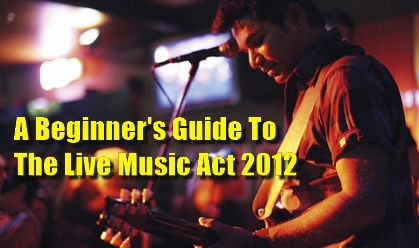A significant piece of legislation was enacted in March 2012 that relates to the provision of Live Music in pubs, when it came into force on October 1st 2012 saw the partial de-regulation of its provision. April 6th 2015 saw further amendments to the regulations.
The Live Music Act 2012 – What it does:
- remove the licensing requirement for unamplified live music taking place between 8am and 11pm in all venues, subject to the right of a licensing authority to impose conditions about live music following a review of a premises licence or club premises certificate relating to premises authorised to supply alcohol for consumption on the premises … so your favourite acoustic folk band or jazz combo can strike up a tune at the drop of a hat
- remove the licensing requirement for amplified live music taking place between 8am and 11pm before audiences of no more than 500 persons on premises authorised to supply alcohol for consumption on the premises, subject to the right of a licensing authority to impose conditions about live music following a review of a premises licence or club premises certificate … so as long as it’s not after 11pm and you have less than 500 in the audience you can have your favourite thrash metal band playing too.
- remove the licensing requirement for amplified live music taking place between 8am and 11pm before audiences of no more than 500 persons in workplaces not otherwise licensed under the 2003 Act (or licensed only for the provision of late night refreshment) … this clause isn’t relevant to pubs, but I mention it for the sake of completeness
- remove the licensing requirement for the provision of entertainment facilities … so no costly alterations to the premises
- widen the licensing exemption for live music integral to a performance of Morris dancing or dancing of a similar type, so that the exemption applies to live or recorded music instead of unamplified live music … so get the men and women with the bells and bladders even if they dance to a backing track
What the exemptions mean to pubs
These exemptions apply to all premises licensed to sell alcohol under the Licensing Act 2003 i.e. pubs, clubs, bars, cafés. In practical terms this will mean many of the conditions applied to Premises Licences under the Licensing Act will no longer apply. So, for instance, the need to keep windows and doors closed during previously regulated entertainment won’t apply if the provision of that entertainment falls within the scope of the exemptions (above).
Whilst the de-regulation will undoubtedly make it easier to provide informal entertainment, especially live music, you shouldn’t be tempted to throw caution to the wind in relation to noise nuisances your pub might cause. The same best practices for keeping noise pollution emanating from your pub that you should already be employing should continue as the last thing you’ll need is a noise nuisance complaint made against you or a Noise Abatement Notice registered against your pub.
The new exemptions also mean that you will be able to provide unamplified music to audiences in your beer garden, whether it is covered by your premises licence or not. In the case of amplified music in beer gardens that are included in the premises licence the existing conditions that may be attached to your premises licence would be exempted. Again being a ‘considerate neighbour’ in terms of the noise should be taken into account.
As long as you adopt a sensible approach and policy to providing Live Music you shouldn’t fall foul of the local authority and avoid any review of your Premises Licence, which, could prove costly and inconvenient to your business. You will only get one chance to get it right and benefit from the Live Music Act so make sure that your operation doesn’t contravene either the licensing law or planning laws that might relate to your premises.
For further advice see my separate articles on Live Music, Licensing Law and Noise Pollution click on the links.
Top Tip – if you are in any doubt whatsoever about how the new law affects your pub you should seek professional legal advice and the advice of your local Licensing Authority.
